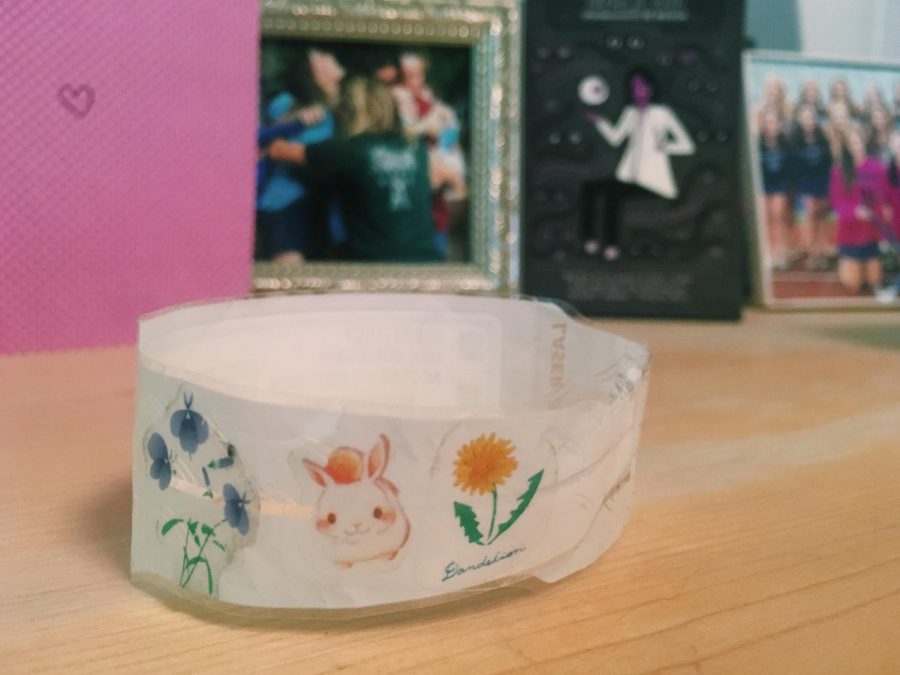Asking for Help
Stacked on top of my wooden dresser sit three hospital bands. One, from Ann Arbor, Mich., is thick, loose enough that it was slipped off my wrist while I sat at my kitchen table. A second, from Louisville, Ky., is smaller, made of itchy plastic with an uneven cut through it from a pair of nail clippers. The third band, from a hospitalization in Grand Rapids, Mich., has a plastic surface crinkled and adorned with small stickers — a peach-colored rabbit, a dainty dandelion, and a peeling bunch of violets. This band — the third one — holds at the same time both some of my worst and some of my best memories.
The first and second bands were from the same week: the week I broke my hand. One is from surgery, the other from the emergency room. The third band is from a few short months before, when I was hospitalized because I could no longer be trusted to keep myself safe. Number three was the result of a depressive episode.
It was on my wrist while I sat in the corner of my wing of the hospital. Beside me, companions nearly as constant as my hospital band, were people who have changed my life. There was Natalie*, our dancer, the girl who helped me convince our fellow patients that it would be more fun to watch Animal Planet than the Super Bowl. There was Alex*, who liked the same music as me, and Maria*, who wanted to become an astrophysicist. And, of course, there was Zak* — our rapper, our rebel, and one of the most genuinely caring people I have ever met.
Yet hardly anyone in my life, hardly any of the friends I’ve known for years, even know that these people exist. They haven’t heard about the time Zak tried to escape, or the time my psychiatrist spoke to Natalie and me about saber-toothed tigers, or the time Maria, a Catholic, told the chaplain that she was a Satanist. They don’t know about the dance parties my roommate and I would have when one of us was particularly sad, or the bitterness we all hosted when a nurse started doing one of our puzzles — the nerve! They don’t know about this segment of my life, because all my life, society has impressed upon me that being hospitalized for my depression is embarrassing, while being hospitalized for a physical ailment is completely normal.
People don’t tend to talk about their mental health. It can’t be seen, so the suffering that comes with mental illness is viewed as lesser than, say, a broken bone. When I was hospitalized after breaking my hand, I was open about it. I wasn’t embarrassed in the least — after all, it was just bad luck that the injury had happened. All my friends knew, and I could make jokes about it with ease.
With my psychiatric hospitalization, however, I found myself avoiding openness. As I returned to school, a single sentence that had been spoken to me while in the hospital played on repeat through my mind. “You don’t seem like someone who would be depressed,” one girl had said, putting words to my fears. As a white, relatively well-off person, I felt I didn’t deserve to be depressed, and that I should be able to “snap out of it” and help those who, in my eyes, had “more reason” to feel sad. I knew I didn’t fit the stereotype of a depressed teenager, as I’ve always been an athletic, energetic person, but this invalidated me to the point where I realized I didn’t fit in anywhere. I was too depressed and anxious to feel like I truly belonged in my day-to-day routine, but didn’t appear depressed, and therefore didn’t feel like I truly fit into the psychiatric hospital setting, either.
The stigma surrounding mental health can kill. According to the National Alliance on Mental Illness (NAMI), in 2017, only 50 percent of youth were given the mental health services they required. NAMI has found that suicide is the second most common cause of death in teenagers, showing that many teens are not provided sufficient assistance for their mental illnesses. This can be due to both the difficulty of getting mental health treatment, and the negative associations that surround asking for help.
For some time, I felt that I was weak for needing so much help with my mental health. Brainwashed by the stigma of mental illness and portrayals of mental illness in the media, I viewed psychiatric hospitalization as something I should be ashamed of. I’ve realized, though, that my hospitalization is something I should be proud of. I reached out and got the help I required, which I now know was a sign of courage, not of weakness.
Asking for help is hard. But if you struggle with mental illness, you aren’t alone. There are people like me who are still alive, even if sometimes the smallest things can make me want to give up. Reach out. It will be worth it, because you, and your life, are worth it.
*names have been changed to protect anonymity




